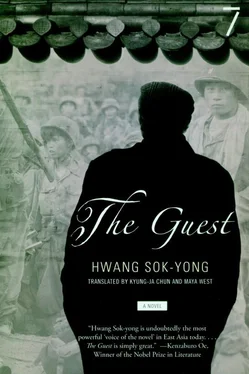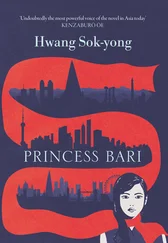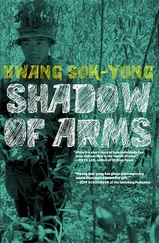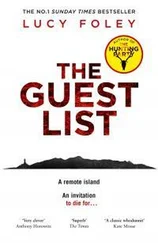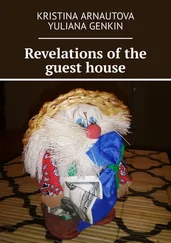I had an accordion myself, but I lost it on the day I hurt my leg, Hong volunteered.
Yes, but you still sing very well, Big Sister, Kang said, bracing the violin against her shoulder and pressing down on it with her chin.
Are you Christian, Yosŏp?
Yes. I’m going to go to a seminary when I get older. Do you go to church?
I went to Bible school one summer — a long time ago.
With that, Kang applied the bow to the strings and began to play. The first song she played was the hymn I’d sung as I climbed up the side of the ravine. Unlike my voice, which had only just begun to change and so was wrought with unexpected squeaks and cracks, the fragile sound of the violin, trembling as the notes went lower and lower, touched me deeply.
Please, play something else. Just one more.
Kang and Hong thought together for a moment. Kang spoke first.
What about “Touch-me-nots”? That’s one of my favorites.
Kang began to play, and Hong, her voice rather low and quite deep, sang.
Inside the wall, touch-me-nots bloom.
Standing there, so melancholy,
Endlessly long, hot summer days,
Always you bloomed so gorgeously,
Beautiful maids, maids pure and true,
Once smiled and played, welcoming you.
The violin seemed to sob more than ever at the crescendo, and the song’s melody left me with a long, lingering aftertaste. My face burned, my throat soared, and, out of the blue, tears gushed out of my eyes. Sniffling, I wiped my face with my sleeve. Ah, suddenly, an entirely different world was opening before my eyes. Each of us must have been deep in our own thoughts; no one said a word. After a long silence, I asked them, What kind of soldier carries music instead of guns?
Well, you see, we’re members of the Cultural Enrichment Corps. We go around from troop to troop and perform for them to cheer them up.
It occurred to me that these girls probably hadn’t done a single thing to be ashamed of in this war. I was capable of making judgments, too, just like my big brother and his friends. I resolved then and there to protect those girls.
As soon as it got dark that night, I crept out of the house with a blanket and a basket of cooked rice. I led the girls down the ravine, taking them across the fields and into the orchard. The place was packed with the gnarled, twisty branches of the naked apple trees. I had a specific spot in mind — we’d used the place to set up the headquarters of our gang when we were little kids. It was a mud cellar, about six feet deep and roofed with thatched straw, set into the sunny side of the small hill at the far end of the orchard.
When we got there we lifted the straw cover aside and looked down inside. It was pitch black and impossible to see into, but a soft, warm earthy scent wafted up from inside. I took some matches out of my pocket and kindled a little resinous knot of wood from a pine tree, something we used a lot those days when candles were hard to come by. The whole cellar lit up. Tiny saplings, about as thick around as a finger, had been planted densely all over the room. In one corner there was a sprinkler, a small hoe, a shovel, and a bucket, all next to a stack of hay. I spread the blanket over the haystack. It looked spacious enough for two people to lie down. Sitting on the haystack, Kang Miae and Hong Chŏngsuk polished off the food — all I could find to bring them was some cold cooked rice and a bowl of kimchi . Reaching into their military jackets, they each took out a stumpy looking spoon, rubbed it a couple of times on their sleeves, and got down to business. They were the same kind of spoons we used in regular households, but their long handles had been cut in half to make them more portable.
Picking up a bucket, I went out to get some water. I walked down to the entrance of the orchard, where the trail cutting through the fruit trees met with the main road leading into the village. There, left over from the Japanese occupation, stood a run-down clapboard warehouse used for storing fruit. There was a water pump in front of the warehouse. I pumped water out into the bucket, together with a racket of rusty, squeaky noises. On the way back, carrying the bucketful of water, my heart began to grow warm. I had taken a great fancy to Kang Miae, so small and slender, just like a little girl. I believe it began at first sight.
I never went anywhere near the orchards during the day, only going to visit the girls at night. Each day it became harder to find food for them. Some days we had leftover rice, but often the only thing left after our meals were the newly washed dishes. Sometimes I’d go over to my brother’s house and search out some more sweet potatoes. Other days I’d be reduced to scooping up some fresh beans from the cellar. I’d been taking care of the girls for eight, nine days maybe — not quite ten. It was only the middle of November, but snowflakes had already started to fall from the sky and each day was much colder than the one before.

Before I actually did. what I did, I went home about three or four times. Once, I know, I went by car because I was delivering some food. On my other visits, I probably just took a bicycle. I think it was during my second visit home, around dinnertime or so, as I sat, for the first time in a long while, for a meal that Mother had prepared. Not really thinking anything of it, I said, I don’t see Yosŏp anywhere.
Ha! Tell me about it. Who knows what he’s up to — he goes out practically every night these days.
This may be the boonies, but it’s still not a good idea to be roaming around after dark, especially not now.
I think the boy’s just growing up. He puts away a couple of bowls of rice in no time at all, said Father.
A couple? Ha! It’s a lot more than a couple! Yesterday he came back from one of his evenings out and practically inhaled all the leftovers in this house, said Mother.
Even then, though, I didn’t think much of it. I headed back to our wing behind the main house to see my pregnant wife and my little daughters. I was on my way back out when I saw something dark lurking around the kitchen.
Who’s there?
It’s only me, Big Brother.
It was Yosŏp. Remembering what our parents had said, I thought I’d give him a hard time.
What the hell do you think you’re doing, wandering all over the place these days?
Oh, well, my friends and I, we’ve set up this. clubhouse, and.
A clubhouse? How old are you? You’re such a child! You’ve got no sense at all. Wandering around after dark these days is a good way to get yourself shot. There are no sides anymore — you got that?
Yeah, I got it.
Listen, Yosŏp, when I’m not around, you gotta take care of Mother and Father, especially now that your sister-in-law can’t do everything. Boys barely a couple years older than you are out there right now, fighting, shooting guns. At night, you stay put at home. Understand? Answer me!
Yes. Yes, I will.
Later that same afternoon, there was quite a scene up at the county hall. Ch’oe Pongsu, the leader of the Youth Corps, had called Sangho to his office and was screaming at him. When I walked in, Pongsu immediately started yelling at me as well.
What in the hell is going on here? A member of the Youth Corps covering for a Red? Does that make any sense to you?
Looking from Sangho, who sat there hanging his head, to Pongsu and back again, I asked, What the hell are you talking about?
Oh, so, you didn’t know either? The leader in charge of the northeastern districts has been reported and arrested — he was harboring a female Party member!
As we reached the one-month mark after taking control of the district, the level of official discipline began to crumble. They say it happened because our patriotism had been corrupted. Some of us began to extort property from the Party members, taking their lives as a kind of mortgage, and many of our men started taking advantage of the women. Rape cases became more and more frequent with each passing day, but we all just left each other alone, pretending nothing had happened. I turned to Pongsu.
Читать дальше
